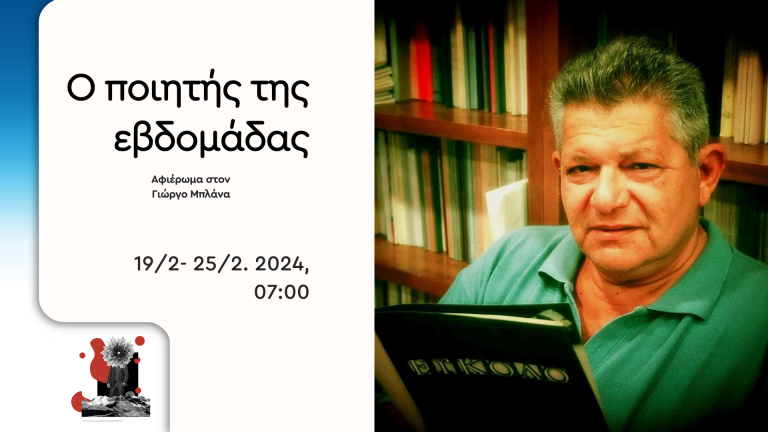Voice of Greece modifies its program and dedicates the week that has just begun, to the award-winning poet and translator Giorgos Blanas, who passed away on Sunday, February 18th.
From today, Monday, February 19th at 19:00 Athens time and until Sunday, February 25th, the poems he had read in the studio in January 2020 will be broadcast in replay.
These are the two-minute poetry tributes entitled “The poet of the week”.
Giorgos Blanas (1959 – 2024 ) was a Greek poet. He studied Library Organisation and Management and has worked as a librarian, publicity officer, translator and editor.
He first appeared in literature in 1982, in the pages of the historical magazine Grammata kai Technes. In 1987 he published his first book of poetry, titled I Zoi Kolympa san Falaina Anypopti prin ti Sfagi, which was greeted with rave reviews, noting its emotionally charged – yet lucid and evocative – language and its philosophical concerns. Since then, he has published 12 books of poetry and numerous translations of contemporary, classical and ancient Greek works. He has received awards for his work: the Diavazo Magazine Prize (for his poetry book Stasiotika [1-50], the Karolos Koun Prize (for the translation of Euripides’ tragedy Heracles), the Greek State Translation Prize (for the translation of Vasily Grossman’s novel Life and Fate).
He lived in Athens and was dedicated to poetry, translation, drama and literary criticism. According to reviews, his neo-romantic poetry is characterized by highly elaborate language, reflective depth and a biblical air. He creates works from a modern perspective, ambitious projects which go beyond all preceding tradition, to approach postmodern practices of transgressing the boundaries, the barriers between different genres of discourse, and attempting to rewrite history as he perceives it, with a sympathetic attitude towards the suffering of modern man.
